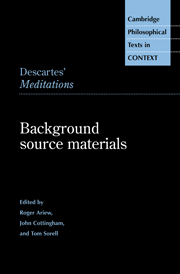Book contents
- Frontmatter
- Contents
- Preface
- Abbreviations
- General Introduction
- 1 Dialectic
- 2 That Nothing Is Known
- 3 The Promotion of Mathematics
- 4 Metaphysical Disputations
- 5 Wisdom
- 6 A Compendium of Philosophy in Four Parts
- 7 Corpus of Philosophy
- 8 The Use of Reason, The Impiety of the Deists, and The Truth of the Sciences
- 9 Unorthodox Essays against the Aristotelians
- 10 The Two Truths and The Immortality of the Soul
- 11 Dialogue on the Diversity of Religions and Little Skeptical Treatise
- 12 Universal Science
- 13 That God Exists
- Appendix: Condemnations of Cartesianism
- Bibliography
- Index
7 - Corpus of Philosophy
Published online by Cambridge University Press: 05 June 2012
- Frontmatter
- Contents
- Preface
- Abbreviations
- General Introduction
- 1 Dialectic
- 2 That Nothing Is Known
- 3 The Promotion of Mathematics
- 4 Metaphysical Disputations
- 5 Wisdom
- 6 A Compendium of Philosophy in Four Parts
- 7 Corpus of Philosophy
- 8 The Use of Reason, The Impiety of the Deists, and The Truth of the Sciences
- 9 Unorthodox Essays against the Aristotelians
- 10 The Two Truths and The Immortality of the Soul
- 11 Dialogue on the Diversity of Religions and Little Skeptical Treatise
- 12 Universal Science
- 13 That God Exists
- Appendix: Condemnations of Cartesianism
- Bibliography
- Index
Summary
Introduction
Scipion Dupleix (1569–1661) was a historian and pedagogue. He was engaged in the service of Marguerite de Valois, first wife of Henry IV, and became the tutor to her son. He then became the king's historian, in the service of Cardinal Richelieu. As part of the duties of that office, he wrote numerous histories of France and its kings. From 1603 to 1610 he published various parts of an extremely popular multivolume French-language philosophy textbook (Logic, Physics, Metaphysics, and Ethics), which he ultimately issued as Corps de philosophie. Descartes probably did not read the work. He recalls his own collegiate textbooks as those of various Jesuits – the Coimbrans, Franciscus Toletus, and Antonius Rubius – and when he consulted such philosophy texts later on in life, he read the one by Eustachius a Sancto Paulo and looked over the one by Charles Frangois d'Abra de Raconis. Still, Dupleix offers a good representation of what was commonly known at the time; in doctrinal contents, Dupleix's textbook looks very much like those of Eustachius and de Raconis. Thus, the following selections should be considered as seventeenth-century Scholastic background to Descartes' philosophy. They consist of a complete book from the Logic, about science and demonstration (discussing various topics deriving from Aristotle's Posterior Analytics); an almost complete book from the Physics, about the principles and causes of natural objects: matter, form, privation, and the four causes (deriving from the first two books of Aristotle's Physics); and a selection from the Physics and Metaphysics about human knowledge, the understanding, and the senses – concerning the question whether knowledge is innate or comes from the senses.
- Type
- Chapter
- Information
- Descartes' MeditationsBackground Source Materials, pp. 97 - 135Publisher: Cambridge University PressPrint publication year: 1998



